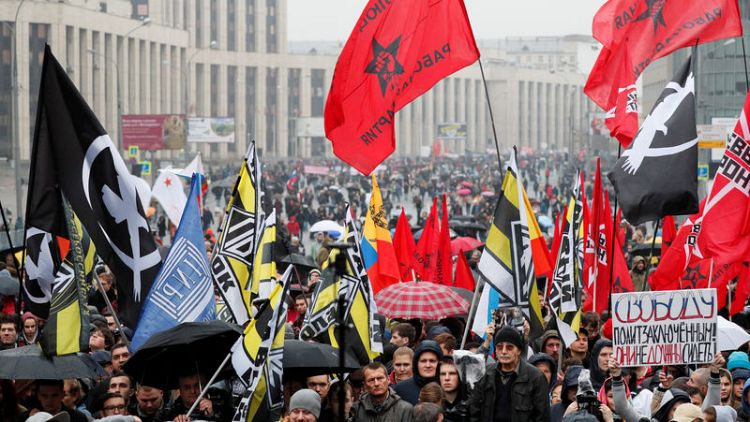By Tatiana Voronova and Tom Balmforth
MOSCOW (Reuters) - Thousands of Russians rallied in Moscow on Sunday to demand the release of protesters jailed in what Kremlin opponents says is a campaign to stifle dissent.
The protesters were arrested during demonstrations since July against the exclusion of many opposition candidates from a local election, and allegations of police brutality and what many Muscovites saw as harsh jail sentences have sparked an unusual public outcry.
Several people were sentenced to up to four years, and others are being prosecuted, for crimes such as violence against police officers.
In a rare step following the outcry, courts freed one person on bail and dropped charges against another. But President Vladimir Putin's opponents say the moves may be a tactic to avoid wider concessions and want to step up pressure for others to be freed.
Opposition politician Leonid Volkov said a high turnout on Sunday would compel the government to release more people.
"If there are 50,000 people, they'll let everyone out," Volkov wrote on Twitter ahead of the rally.
Protesters filed through metal detectors under light rain, waving flags from an array of opposition groupings of starkly different political stripes.
A crowd of 18,000 people had been counted 30 minutes after the start of the rally, according to the White Counter group which monitors political protests.
The rally has been authorised by the Moscow mayor's office, meaning mass detentions by police are less likely to happen.
The series of protests began in July when more than a dozen opposition-minded candidates were not allowed to run in a Sept. 8 election to Moscow's city legislature on a technicality.
The police says people were detained or prosecuted for breaking the law and that the protests had to be dispersed as they had not been authorised and were illegal.
After his allies were barred from the vote, opposition leader Alexei Navalny called on supporters to vote tactically for opponents of the ruling United Russia party, regardless of their political stripe.
United Russia, which supports Putin, lost a third of its seats in the Moscow city assembly, a setback for the authorities that Navalny said was a victory for the Kremlin's opponents even though the governing party kept its majority.
The rallies were the largest sustained protest movement in Moscow in almost a decade, peaking at around 60,000 people, before appearing to lose momentum.
(Additional reporting by Katya Golubkova and Maria Vasilyeva; Editing by Timothy Heritage/Katya Golubkova/Susan Fenton)
